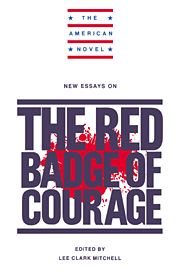Book contents
- Frontmatter
- Contents
- Series Editor's Preface
- Note on the Text
- 1 Introduction
- 2 Getting Used to the “Original Form” of The Red Badge of Courage
- 3 The American Stephen Crane: The Context of The Red Badge of Courage
- 4 The Spectacle of War in Crane's Revision of History
- 5 “He Was a Man”
- 6 Ill Logics of Irony
- Notes on Contributors
- Selected Bibliography
1 - Introduction
Published online by Cambridge University Press: 08 January 2010
- Frontmatter
- Contents
- Series Editor's Preface
- Note on the Text
- 1 Introduction
- 2 Getting Used to the “Original Form” of The Red Badge of Courage
- 3 The American Stephen Crane: The Context of The Red Badge of Courage
- 4 The Spectacle of War in Crane's Revision of History
- 5 “He Was a Man”
- 6 Ill Logics of Irony
- Notes on Contributors
- Selected Bibliography
Summary
Stephen Crane burst into fame with The Red Badge of Courage (1895) at the age of only twenty-three. Readers on both sides of the Atlantic applauded, marveling that an author too young to have known war had written about it so compellingly. And as if to confirm for himself the authenticity of his novel, Crane rushed off to battle at the first opportunity, arousing public interest in a life that came to seem even more exciting than his fiction. Like other American writers from Poe through Hemingway, he became something of an invented cultural figure – an exotic adventuring in war and in love, plagued periodically by the effects of drugs and of syphilis. Unlike their stories, however, few of his resembled his experience, and what interests us now in Crane is precisely his active fostering of biographical confusion. He seems to have enjoyed contradiction in his life even more fully than in his art, repudiating assorted conventional labels out of an irrepressible impulse toward self-revision. As Ford Madox Ford wryly observed: “I have known him change his apparent personality half a dozen times in the course of an afternoon.” Crane still remains elusive, both as biographical figure and as literary artist, and for reasons remarkably similar, requiring similar kinds of caution. The contradictions and repudiations that characterized his behavior, even the abbreviated nature of his career, are qualities repeated in his prose and poetry, with the collective effect of casting dubiety upon nearly all claims about him or his art.
- Type
- Chapter
- Information
- New Essays on The Red Badge of Courage , pp. 1 - 24Publisher: Cambridge University PressPrint publication year: 1986

